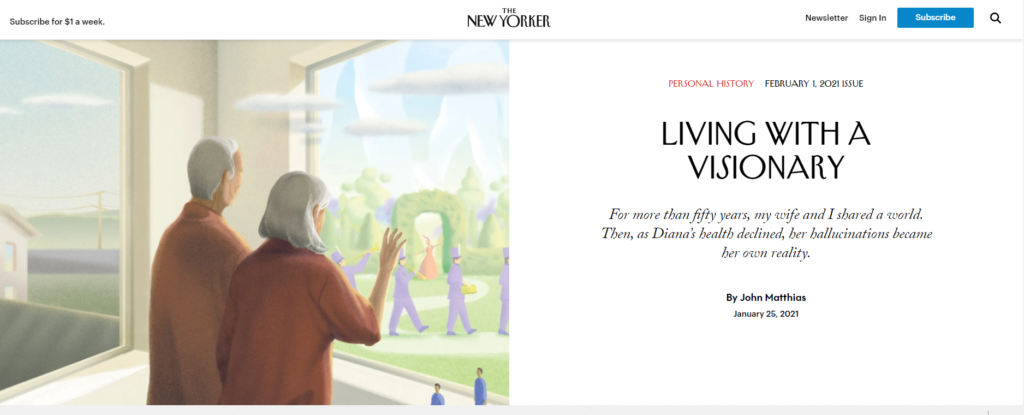“Living with a Visionary” is a beautifully written essay by John Matthias, Professor Emeritus and writer, published in the New Yorker on February 1, 2021. It starts out as one of the most touching descriptions of living with a person with dementia that I have ever read. His wife, Diana, had Lewy Body Dementia and he describes, with skill and compassion, how he took care of her and learned to cope with her bizarre hallucinations, so typical of this condition. As the story unfolds, it becomes much darker and it ends with a disaster that could have been avoided. My heart went out to him and to his late wife as he described their struggles to keep going as her dementia progressed. He became lost in her bubble of unreality and neglected his own self-care. A crisis is reached when Diana is found wandering outside and the neighbors call the police. They are both taken to the hospital. Diana is sent to an assisted living facility near their daughter and Mr. Matthias is finally discharged back home. Meanwhile, Diana catches COVID-19 at the assisted living facility and dies. Due to the pandemic, Mr. Mattias is unable to travel to be at her side.
As the story unfolds, it becomes much darker and it ends with a disaster that could have been avoided. My heart went out to him and to his late wife as he described their struggles to keep going as her dementia progressed. He became lost in her bubble of unreality and neglected his own self-care. A crisis is reached when Diana is found wandering outside and the neighbors call the police. They are both taken to the hospital. Diana is sent to an assisted living facility near their daughter and Mr. Matthias is finally discharged back home. Meanwhile, Diana catches COVID-19 at the assisted living facility and dies. Due to the pandemic, Mr. Mattias is unable to travel to be at her side.
I was deeply affected and shaken by this article and by this couple’s unnecessary suffering. They were educated, sophisticated, and obviously had some financial resources. We can’t prevent all heartbreak, but so much of their ordeal was preventable. Their story highlights the importance of planning for one’s care before the crisis. This couple and their daughter would have truly benefited from developing a relationship with an Aging Life Care Manager® when Diana’s dementia was first diagnosed or preferably when they were both still in reasonable health and able to plan for their futures. Aging Life Care Managers are trained to work with older people and their families to help them stay as independent and as safe as possible for as long as possible. We are experts in dementia and end-of-life and we support couples and individuals as they age. Many of us work with people with disabilities and with mental health issues. We ensure that clients are safe and receiving adequate care, but more importantly, work with them to enhance their quality of life.
Since this article was published, I started working with a family in a very similar situation. The couples’ son contacted me about two years ago when the dementia of the husband Peter was starting to impact their lives. At the time, his wife, Susan, did not see the necessity of meeting with me. Recently, Susan was hospitalized for a medical condition, and Peter, who now has quite severe dementia, became distraught and aggressive. The police were called and he was hospitalized in a psychiatric unit. The son contacted me when the hospital refused to discharge Peter, as he was still agitated. I helped facilitate Peter’s transfer to the convalescent hospital where the wife was receiving care. As soon as he was back with his wife, he calmed down. I assisted in the discharge process, coordinated their return home with 24-hour care, and referred them to a company that could make needed safety accommodations in the home. An important aspect of this process is the support and counseling I am providing to the couple’s son in dealing with his fiercely independent mother who is finding it very hard to accept strangers in her home. This is what we do!
If I had been involved sooner, we may have been able to prevent some of this mayhem. But without the help I provided in navigating these treacherous waters, Peter would have stayed at the hospital for much longer and might have declined to a point where he could no longer live safely at home. The son might have caved into Susan’s pressure and agreed to inadequate care on their discharge home – and this would have brought about another hospitalization and more chaos. Aging Life Care Managers are not miracle workers, but we can help families in tough situations.
I encourage you to have open conversations about you and your loved ones’ situation – it is never too soon. Reach out to a local Aging Life Care Professional®. We are there to help you plan your lives as you age, and also to step in when needed in a crisis.
About the author: Brenda Shorkend, MA, CMC is an independent Certified Aging Life Care Manager at Shorkend Care Management. She has extensive experience working with older people and people with disabilities and their families. She has a background in rehabilitation psychology and is a strong advocate for her clients. She is Chair of the ALCA Standards Committee.